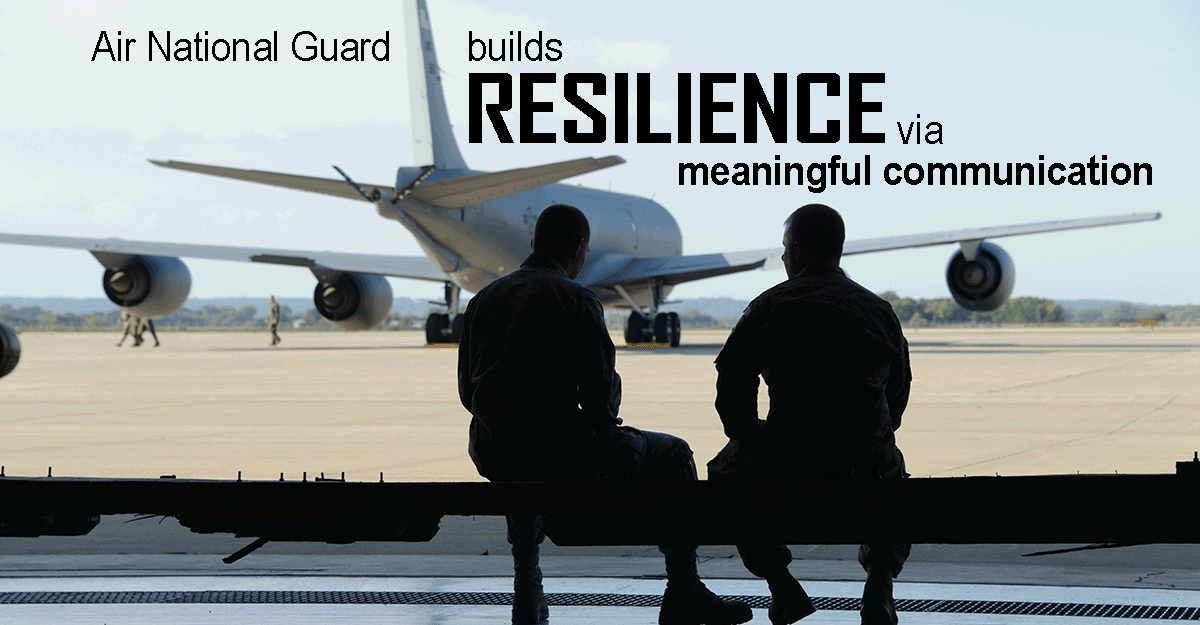Health of the Force
Air National Guard builds resilience via meaningful communication
Story by Sgt. 1st Class Chad Menegay, Ohio National Guard Public Affairs
The Department of Defense’s most recent Annual Suicide Report, released Oct. 1, 2020, stated that the National Guard suicide rate in 2019 was comparable with the U.S. adult population, after accounting for age and sex. The rate declined from a record high 30.6 suicide deaths per 100,000 Guard members (136 people) in 2018 to 20.3 suicides per 100,000 Guard members (89 people) in 2019. Still, despite that 35% year-to-year reduction, the Pentagon reported Oct. 15, 2020, that 51 National Guard members died by suicide in the first half of 2020.
In the third in a series on suicide prevention, we explore who is working to solve the National Guard’s suicide problem, and where have we responded to that problem successfully.
COLUMBUS, Ohio (11/27/20)
Health of the force certainly is of primary concern in the year 2020, but that is not to say military leaders are solely focused on COVID-19 prevention. Many worry that the added stress and social isolation caused by COVID-19 might result in a higher suicide rate. So, while 11 service members have died from COVID-19 as of Nov. 23, a total of 260 service members died by suicide in the first half of 2020, per the Pentagon.
The Air National Guard, for its part, is working to build resilience in its force with a conversation-based approach designed to build connections and strengthen relationships.
“There’s a big mission of, you know, defending the country, but we also have to figure out how we’re taking care of each other,” said Amy Hernandez, the director of psychological health at the 178th Wing in Springfield, Ohio.
Hernandez cited the Air Force’s fall 2019 Resilience Tactical Pause as a driving force to program development in 2020. Airmen across the total force got together in small groups to ask questions and brainstorm solutions on building resilience through connectivity.
“What can we do differently?,” Hernandez offered. “What can we do better? How do we demonstrate loyalty to one another?”
The Resilience Tactical Pause aimed to give units a chance to halt routine training operations and communicate issues of resilience and health in the wake of record-high suicides among service members.
This year Air Force Materiel Command launched AFMC Connect, a new initiative that aims to increase unit cohesion and connectedness. The program offers Airmen time, tools and resources to foster a culture of regular communication in hopes of building higher levels of resilience. Leaders facilitate 15-30 minute discussions on training topics with tools and implementation guidance.
The Air National Guard also recently created a suicide analysis board that included an in-depth review of Air National Guard suicide deaths. Based on the findings, the board developed recommendations to prevent future suicide deaths.
The Ohio Air National Guard, in conjunction with the Ohio Army National Guard, offers the Mental Health First Aid course, which is a skills-based training course that teaches participants about mental health and substance-use issues.
“Airmen are learning skills on what to do when they have a wingman in crisis,” Hernandez said. “We’re giving people the tools they need to help each other.”
This year as well, the Air Force released a video-based, online suicide prevention training for families. “Equipping Family Members to Help Airmen in Distress” seeks to educate viewers on ways to intervene and access resources. It also focuses on ways to build resilience, including eating right, sleeping right and building strong relationships.
The Air National Guard’s push for meaningful communication aligns with its suicide prevention mission statement: “to reduce suicide through education of military community members about suicide risk and related behaviors; promotion of health, resilience and help-seeking behavior; research, development and delivery of effective programs and services; and promote access to care.”
Unfortunately, six Air National Guard members died by suicide in the second quarter of 2020, compared with three Air National Guard deaths in the second quarter of 2019. Of course, an increase in numbers does not mean the new programs are not working. COVID-19 may potentially be having a negative impact on the health of the force in ways that many have not experienced before, and perhaps time will tell its real impact on mental health. What is known is that many — perhaps more than ever before — in the Air National Guard are increasing efforts to reduce suicide numbers.
There has been a major, renewed emphasis on determining what members of the Air National Guard can do to take care of each other better and prevent each other from being distressed, Hernandez said.
